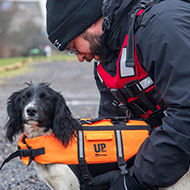
Bella is 'settling in well' in her new role.
A spaniel who was rescued by the RSPCA has become a police detection dog in Kent.
Bella, a 'sprocker' Spaniel, was rescued from inappropriate living conditions in May 2021, where RSPCA team members noticed Bella's energetic and busy personality, and realised that she would be perfect for police work.
Nick Wheelhouse, chief inspector at RSPCA Kent, said: “We were called to an address by police and discovered three dogs living in the back of a van in completely inappropriate conditions. They were removed from the site, along with a number of other dogs, and came into RSPCA care.
“When we were able to begin searching for new homes for them I was visiting our centre with the local dog legislation officer and introduced him to Bella. She rushed straight up to him and started playing with the ball he was throwing.
“He turned to me and said she’d make a great police search dog. She was busy, bouncy and full of energy so we knew we might struggle to find her a home that would be active enough to keep up with her, so a working role seemed the perfect fit!”
Bella qualified as a forensic recovery dog this month, and is trained to detect blood to track down evidence at crime scenes, and locate injured people who may need assistance.
Craig West, chief inspector of Kent Police's Dog Section, added: “Police dogs play a vital role in modern policing and work side-by-side with officers and staff to keep people safe and help bring offenders to justice.
“We enjoy a strong partnership with the RSPCA and were delighted to be able to give Bella a loving home and welcome her to the Kent Police family.
`'She is settling in very well and I have no doubt she will continue to make a valuable contribution to the force’s work in the months and years to come.”
Images (C) RSPCA



 The latest
The latest